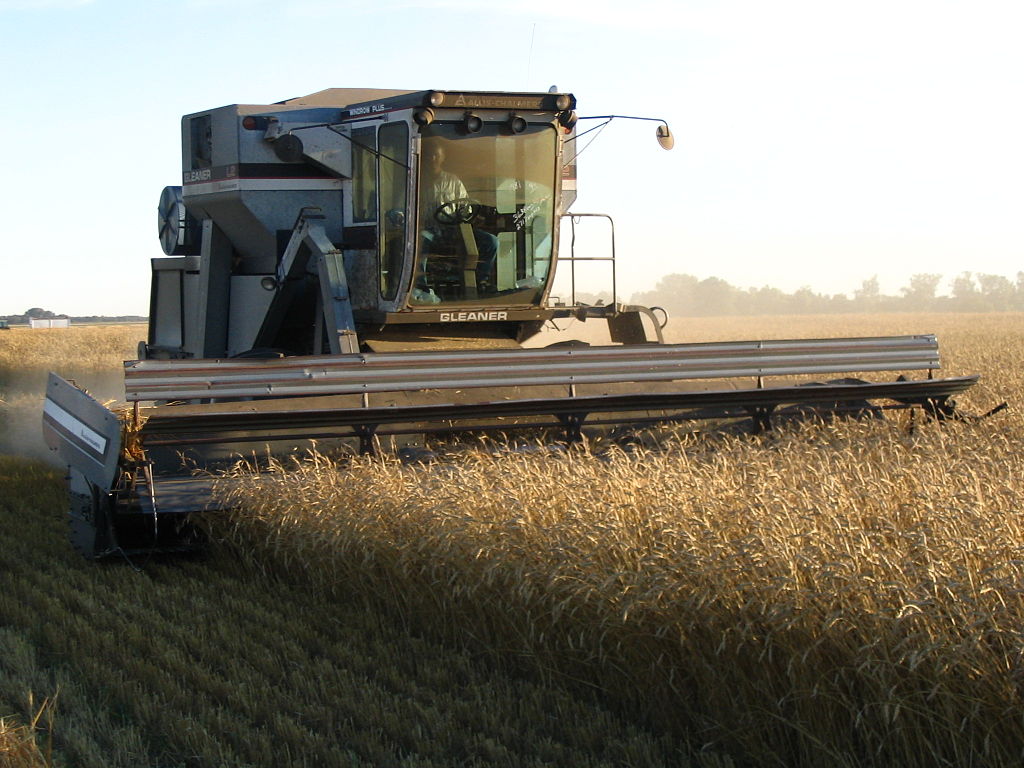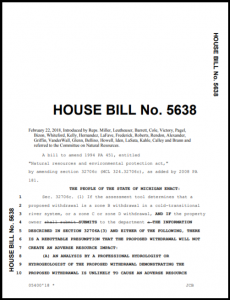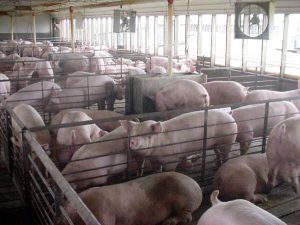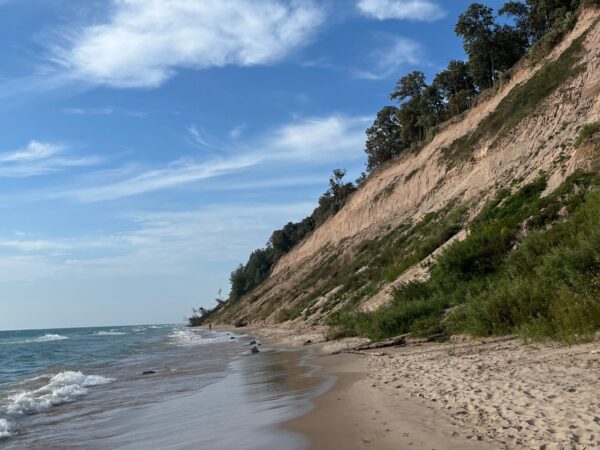
Environmental Activists call it an attempt at a “water grab for Big Ag”
Many farmers say Michigan’s current water withdrawal regulations are cumbersome, costly, and they keep them from getting the amount of water they need to plant their crops in a timely fashion.
But many environmentalists say a recent attempt to change Michigan’s water withdrawal laws to favor farmers would be a “legalized violation” that would lead to the devastation of Michigan’s groundwater.
 Last week, the first hearings were held before state lawmakers on House Bill 5638 which was proposed by Representative Aaron Miller, a Republican from Southwest Michigan, along with 24 other house Republican sponsors. So many people showed up in the committee room, it was necessary to open up a second room for the overflow crowd.
Last week, the first hearings were held before state lawmakers on House Bill 5638 which was proposed by Representative Aaron Miller, a Republican from Southwest Michigan, along with 24 other house Republican sponsors. So many people showed up in the committee room, it was necessary to open up a second room for the overflow crowd.
The bill would not only make it easier for farmers to get permission to draw large amounts of groundwater, it would also exempt certain data on agricultural water use from disclosure under the Freedom of Information Act.
Current water withdrawal laws, which kicked in starting in 2009, require anyone who wants to use more than 100,000 gallons of Great Lakes, groundwater or Michigan river water per day be required to report volume and get approval from the DEQ, according to Great Lakes Compact requirements.
The Michigan Farm Bureau’s Laura Campbell tells Great Lakes Now, “Farmers have been engaged in working with the DEQ on science-based programs to manage water use ever since the Great Lakes Compact was signed.” Campbell says, “Michigan Farm Bureau’s members support the current Water Withdrawal Assessment process and the ongoing university research that seeks to improve it. However, those long-term goals for overall updating of the science will take years to implement and in the meantime, many family farms around the state are facing growing frustration with one portion of the process: the Site Specific Review. “
Campbell says, “Under that system, if the online Tool – which is a coarse screen and designed to be very conservative – shows that a proposed water withdrawal needs additional information before it can be approved, DEQ analyzes additional data collected by the registrant and decides whether the proposed use might cause an Adverse Resource Impact (a term meaning lowering a stream’s level enough to impact habitat for fish species typical to that type of waterway). “
Campbell says, “The current law gives very little guidance on how to do that and DEQ staff ask many registrants for more data than is needed for a qualified person to model and assess, while analyzing that data with a very limited set of tools. They are trying to help, but the process puts registrants through unreasonably long delays and unreasonably high costs to complete this process.”
She says farmers wind up spending lots of money and time on the process and sometimes don’t even get an answer about whether they can move forward with water withdrawal requests in time to plant their desired crops.
“This is a corporate subsidy”
But Jim Olson, an environmental water lawyer who founded the organization called FLOW (For Love of Water) tells Great Lakes Now the bill would legalize devastation of headwaters, creeks and wetlands in Michigan.

Jim Olson, Founder & President, courtesy of flowforwater.org
Olson says, “This is a corporate subsidy. It’s about corporate agriculture in Southwest Michigan.” Olson says the water withdrawal law passed in Michigan in 2008 was considered a great success and the Water Withdrawal Assessment Tool that was created because of it won awards.
And he says if anything, the law has been lenient toward agriculture.
Olson says Representative Miller’s proposed bill “would actually gut the core of the law when it comes to large volume water withdrawal.”
The Michigan Farm Bureau’s Laura Campbell disagrees. She tells Great Lakes Now the proposed bill is simply about cutting back on the bureaucracy.
She says, “HB 5638 by Representative Miller seeks to ease some of that bottleneck. It identifies ways registrants can work with professional hydrologists and hydrogeologists to collect specific types of data, analyze it using the next generation of models created by the same researcher who created the model our current system uses, and submit that information to DEQ if the analysis shows the withdrawal will not cause an adverse resource impact. The bill does not allow ANY withdrawal to go forward if it shows it is likely to cause an adverse resource impact, and it does not remove DEQ’s authority in any way. The agency can stop any use or registration that causes an adverse resource impact, and if a registration is submitted showing an adverse resource impact would be likely, they would still have the ability to stop it.”

Pigs in Concentrated Animal Feed Operation, courtesy of USGS.gov
FLOW’s Jim Olson says, “The back story is there’s some very large CAFO (concentrated animal feeding operation) and high intensity farms in Southwest Michigan. They use a large amount of ground water, and they are taking more than what comes in from the watersheds. They are doing such intense irrigation they’ve reached the limit. This bill would allow them to mine even more water from lakes and streams and wetlands. “
Olson and other environmental activists Great Lakes Now interviewed for this story all cautioned what the proposed bill might mean for corporations like Nestle and FoxConn who are already asking to increase current limits on water withdrawal in the Great Lakes Region.
Olson says what’s worse, if the bill passed, it would make it so “there’s nothing anyone could do about it except file a lawsuit at great expense.”
“There’s nothing secretive about this bill”
Nick Schroeck, Director of the Transnational Environmental Law Clinic at Wayne State University tells Great Lakes Now, “What this bill is doing is protecting farmers from scrutiny for large water withdrawals. “
But the Michigan Farm Bureau’s Laura Campbell says there’s nothing secretive about this bill, and she says no one is trying to hide the facts about the amount of water farmers are withdrawing.
She says, “We have heard some concerns about a provision in the bill protecting the information submitted from the Freedom of Information Act. This is consistent with other parts of the water withdrawal statute (Part 327 of the Natural Resources and Environmental Protection Act), because the legislature has long recognized that there are many parts of our infrastructure that need to be protected from public disclosure to prevent people from misusing the information and interrupting or contaminating a water supply essential to a farm. Many food safety auditing programs now include specific questions farmers must answer detailing how they protect their water supply because of this risk. Therefore, to be consistent with the rest of the Act, this bill also includes agricultural protection from FOIA. All information about the wells, the withdrawals, the annual water use, and all data collected for an agricultural water withdrawal still has to be submitted to the State of Michigan – this is necessary for DEQ to do their job to protect natural resources. However, that specific information should not be available to the public. Currently information about agricultural withdrawals is available on an aggregated basis. Township level and area totals as well as state totals are still publicly available and are published regularly as part of Michigan’s reporting to the Great Lakes Compact Council. “
Campbell says releasing all water withdrawal information to the general public could end up being a security risk.
“A solution in search of a problem”
Wayne State University’s Nick Schroeck is doubtful this bill has anything to do with potential terrorist acts.
He calls the attempt to change Michigan’s Water Withdrawal laws “a solution in search of a problem.”

Nick Schroeck, director of the Transnational Environmental Law Clinic, courtesy of Wayne State University
Schroeck says “this isn’t about the family farmer with the windmill on the back 40. This is about big business trying to eliminate what they see are hurdles and destroy the whole purpose of the Great Lakes Compact. All I can see is that some these permit reviews take too long, and these farmers want a quicker decision. I would argue a bit of delay for large quantities of water withdrawal is OK. Why not get it right? This is about big business wanting to fast-track water withdrawal and eliminate the public’s ability to see what they’re doing and to be involved in the decision-making process. And further, the Farm Bureau wants to use their own paid experts rather than using professionals who work with the MDEQ.”
Schroeck is urging the public to get more involved in protecting Great Lakes water. He says, “We still live in a democracy. People need to reach out to their lawmakers. This thing has already made it to committee. Our current water withdrawal assessment tool has been lauded nationwide, it’s an award-winning management tool, and it’s been working well for ten years. Why are we drafting legislation at the behest of lobbying groups? “
Just as we were about to post this story, Great Lakes Now reached sponsor of the bill, Michigan Representative Aaron Miller, who explained why he believes the water withdrawal laws need to be changed. He says, “While the Michigan Water Withdrawal Assessment Tool is good in many ways, its site-specific review (SSR) process is not defined and does indeed need updating to include better-defined requirements of applicants who need to go through it, most of whom are agricultural growers, the wide plurality of whom are in my district. I introduced the bill to add a layer to the tool that would give an option to growers that is defined and yet one that also protects the environment, using better, more recent scientific models. In short, there is a problem, despite what many would say who do not use the tool on a yearly basis.”
“This has absolutely nothing to do with Nestle”

Michigan Representative Aaron Miller, courtesy of gophouse.org
Representative Miller tells Great Lakes Now, “the practical problem is that an undefined SSR process means a lot of time spent waiting for approval from an SSR process and a lot of money spent trying to fulfill the requirements of an open-ended set of requirements. Those are problems that do not affect the environment or anyone who loves the tool because it helps protect the environment, but they are unnecessary problems nonetheless. One of my constituents just told me the other day that one of his employer’s wells has taken almost two years in the SSR process and still is not approved. He noted that fulfilling the requirements for said well has cost the employer upwards of $70,000. That is unacceptable.”
We asked Representative Miller who this bill helps the most. He says, “Though some will disagree with me, this bill is meant to help define the process for the sake of growers and other applicants but also help protect the environment. This bill still assures that, if any well will cause an adverse resource impact (ARI) to the environment, it will not be approved. That is a good thing for the environment and also the growers and others who draw water from underground sources.”
Representative Miller adds, “This has absolutely nothing to do with Nestlé or any other company bottling water. Those companies would have to go through a completely separate process through another section of code that applies to drinking water, which therefore includes municipal water wells.” He adds, “This bill does not open the floodgates to Nestlé or any company like them.”
Last week during testimony on the legislation to change Michigan’s water withdrawal laws, committee members ran out of time before people opposed to Representative Miller’s bill were able to speak. A second hearing on the bill will be scheduled at a later date.
Great Lakes Now will keep you updated as hearings and testimony on HB 5638 continues. Correspondent Gary Wilson has filed a companion piece on Michigan’s Water Withdrawal Assessment Tool on greatlakesnow.org Also, Detroit Public Television’s Great Lakes Bureau’s documentary on water withdrawal called “Tapping the Great Lakes” will be shown on Detroit Public Television on March 26th at 7:30pm.





